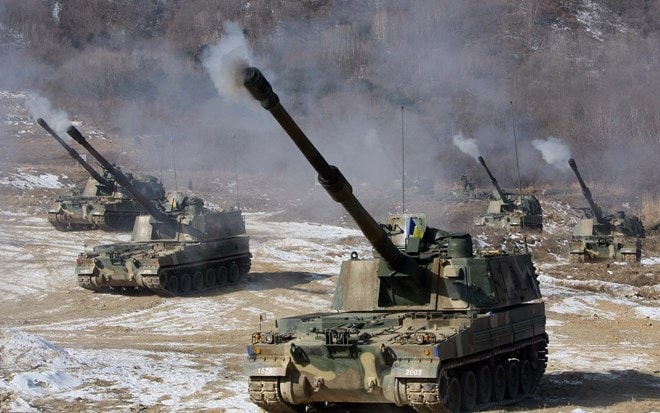Korean Peninsula: Heat rises after "artillery battle"
(Baonghean) - After the artillery exchange between the DPRK and the ROK, at the disputed maritime border between the two countries. This incident has become the fuel that has fueled tensions on the Korean peninsula for many weeks with a series of verbal battles and military exercises. Given the current situation, the international community is extremely concerned about a bad scenario for the nuclear disarmament process on the Korean peninsula.
 |
| South Korea's K-9 self-propelled artillery responded to North Korea on March 313. (Source: YonhapVNA) |
Today, the DPRK conducted live-fire drills in several locations off the west coast of the country. South Korea said that out of more than 500 artillery shells fired by North Korea, about 100 landed in disputed waters and South Korea immediately responded. As a result, the artillery exchange took place in the maritime border area between the two countries. Although there were no signs that the two sides were aiming at any specific target, this military action showed that the tension had been pushed up as the two sides confronted each other directly.
This is not difficult to explain as the Korean peninsula has been in a state of increasing tension for many months now. At the end of February, South Korea and the United States began conducting joint military exercises despite North Korea's strong objections. For its part, the DPRK retaliated with a series of missile tests and today is a live-fire exercise. Many opinions believe that this action by the DPRK is also to demonstrate a tough stance in the face of pressure from the international community. The UN Security Council last weekend condemned the launch of a medium-range missile after a series of rocket and short-range missile launches in recent weeks by the DPRK. Currently, the DPRK is still subject to sanctions from the UN Security Council after long-range missile tests in late 2012 and the third nuclear test in early 2013.
In fact, the maritime border between North and South Korea was the scene of fierce naval clashes in 1999, 2002 and 2009. In November 2010, an artillery exchange at South Korea’s Dong-Pien Island killed four South Koreans. The public is no longer surprised by endless arguments or clashes of this kind between South and North Korea, but what people are worried about is that such actions will cause efforts to mend relations between the two Koreas to “go down the drain”. Recently, public opinion still hopes that the goodwill gesture from both sides can ease the heated atmosphere on the Korean peninsula when the two countries successfully organized reunions of families separated by the war – a program that had been interrupted for 3 years.
Previously, the two sides also resumed operations at the Kaesong Industrial Complex and reached agreements that benefited both sides. South Korean President Park Geun-hye has even announced a number of proposals calling for increased exchanges with the DPRK as the first step towards building trust to lay the foundation for inter-Korean reunification. Among them, calling for South Korea to increase humanitarian aid projects for the DPRK before expanding economic cooperation to major projects such as infrastructure construction or mineral exploitation. However, the recent artillery exchange will certainly be a factor that hinders these future plans between Seoul and Pyongyang.
Moreover, the chances of the parties sitting down at the six-party talks on the North Korean nuclear issue are becoming increasingly fragile because the tension between the two Koreas is unlikely to be eased quickly and easily. This round of talks was held in China in 2003 with the participation of the host country, Russia, the United States, Japan, North Korea and South Korea. However, while the negotiations were underway, the DPRK announced its withdrawal in April 2009, a month before conducting its second nuclear weapons test. Since then, the parties have tried very hard to restart this deadlocked round of talks but have not succeeded because the parties have continued to carry out actions considered "aggressive".
At this point, public opinion cannot predict how the artillery exchange will push the situation on the Korean peninsula and how the retaliatory actions will continue. However, people have reason to worry that the atmosphere of detente will not return in the short term. The DPRK has just announced that it "will not rule out" the possibility of conducting another nuclear test, after the country conducted a medium-range missile launch that was condemned by the international community. The Chosun Ilbo newspaper also recently reported that the leader of the DPRK Kim Jong Un mentioned the possibility of war on the Korean peninsula in 2015.
The lack of concessions between the parties is making it impossible for the Korean Peninsula to escape the vicious cycle of “aggression, retaliation and punishment”. War is clearly something that the whole world does not want. And in the current context, the parties need to control all moves well, not allowing breakdowns to happen.
Thu Ha






